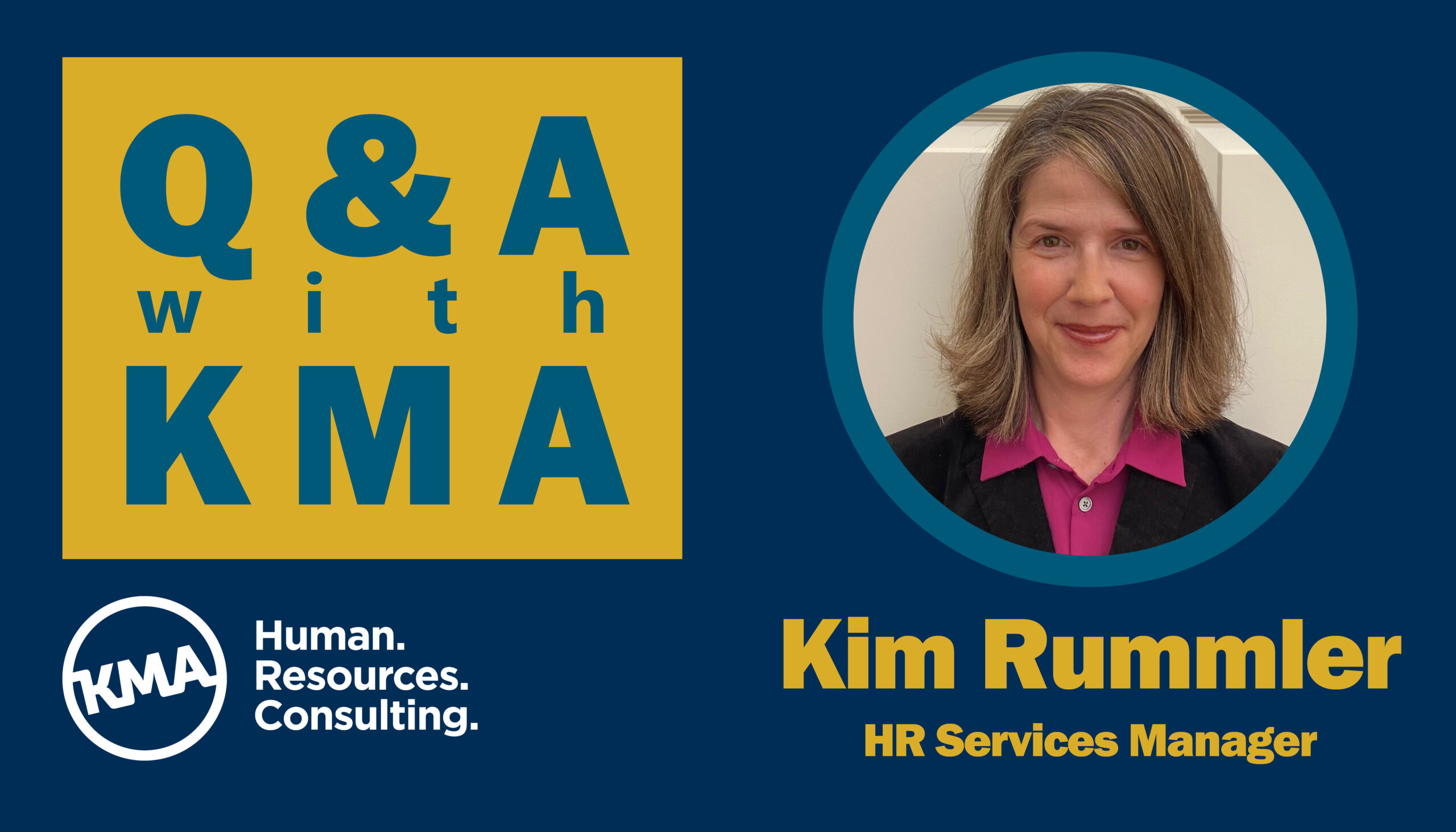 In this Q&A with Kim Rummler, Human Resources Services Manager at KMA, we cover the biggest changes Kim has noticed in her 25+ year career in HR, some current trends that influence her work as a consultant, and the major challenges she’s preparing for in serving her clients over the next year.
In this Q&A with Kim Rummler, Human Resources Services Manager at KMA, we cover the biggest changes Kim has noticed in her 25+ year career in HR, some current trends that influence her work as a consultant, and the major challenges she’s preparing for in serving her clients over the next year.
Q: What are some of the most impactful changes you’ve seen over your career in HR?
One of the biggest changes – particularly in the last 5 years – is the talent issue we’ve been facing. When I started my career, jobs weren’t easy to come by and people felt lucky to have one. These days there just isn’t enough talent to go around, so finding and keeping talent is a huge challenge for employers. Much of the baby boomer generation is retiring, and right behind them is Gen X, and that’s a smaller demographic. Then you have Millennials and Gen Z, and competing for talent in those demographics is complicated, because they sometimes have specific requirements in where they want to work. Things like social and environmental responsibility, a demand for personally meaningful work, work/life balance, opportunities for growth, an ethical employer, flexibility in where and when they work, a culture of diversity, as well as DEI initiatives, these are all carefully considered by many younger workers in deciding who they’re willing to work for.
Another big change is in benefits offerings. Traditional benefits are still important, but today’s employees value different things. Voluntary benefits is a great solution, allowing employees to select the perks that are meaningful for them, whether that’s family forming benefits (such as fertility or adoption assistance), caregiving benefits, or student repayment assistance. Lifestyle savings accounts are getting a lot of traction lately. This is employer funded, taxable income that can be spent on whatever is going to be valuable for the individual employee – things like gym memberships or personal training, financial planning, legal services, learning and development, pet insurance, meal kits, cleaning services. The list goes on. These flexible perks can be very effective in attracting and hiring talent, and something I expect to see more of to meet the needs of an increasingly diverse workforce.
Q: What are your clients’ biggest challenges these days, and how do you address them?
Besides the fight to attract and retain talent, a focus on mental health in the workplace continues to challenge our clients. Gen Z is reported to be the loneliest, most depressed, and most socially isolated generation in the workplace, and it’s falling on employers to help support them through these issues, not just because it’s the right thing to do for employees, but it can also improve productivity, engagement and reduce healthcare costs. I encourage my clients to find creative solutions to support mental health and stress reduction, like mindfulness training, meditation apps, wellness breaks, on-site exercise classes, and other soft perks like those. In the past, it was expected that people would leave their problems at home and not bring that stuff into work, but employers today need to see their employees as whole people with whole lives.
I’m seeing more conflict management and employee relations issues today than at any time in my career. They’ve become both more common and more complex. Employers are very challenged by this, and the tools in the HR toolkit can sometimes feel inadequate. We recommend impeccable documentation, clear communication, transparency, fair and consistent expectations, empathy, respect, patience and the desire to do the right thing.
Q: What’s the most rewarding part of your job?
I am most rewarded when I feel like I’ve helped a client get to the right decision for their company. It’s not necessarily telling them what to do, but providing lots of options and ideas, and being able to explain the pros and cons of those options and helping them get to a decision they feel good about. When my client accomplishes something, I feel like I’ve accomplished something, and that’s very fulfilling.
Q: What advice would you offer someone who is just starting a career in HR, or in consulting?
My advice to someone just getting started in HR is not to specialize too early. The best approach is to start out broad, get an overview of all the different areas of HR before you decide where to focus. And then as you go along, being in HR requires keeping up with your own skill development. Things change so quickly – not just legal or compliance changes, but general employment trends. A good HR practitioner keeps current, and keeps their skills sharp. Effective consultants need top notch communications skills, especially active listening, and the ability to be empathetic and kind – otherwise you’re in the wrong field.
Q: What trends are you preparing for in 2024?
All the benefits trends I’ve already mentioned. Pay increases will continue to be higher than the traditional 2-3%; we’re expecting 4-5% to be typical as workers command higher pay. The proliferation of AI and machine learning in the workplace. And it’s an election year, so we’ll be watching to see the impact on employment law and union activity. 2024 looks like it could be a bit of a bumpy ride, but KMA is ready with solutions to help our clients manage through.
Read also: Kim’s article on Strategies for Improving Employee Wellbeing
